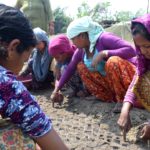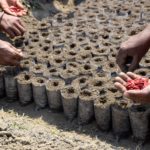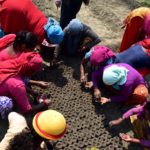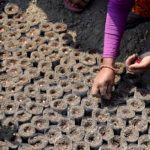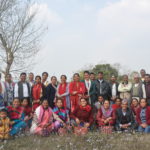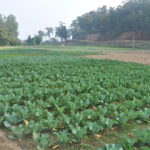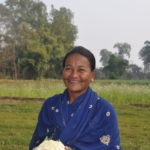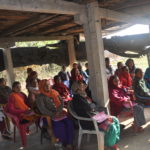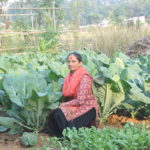Organic farming
85 % of Nepal is located on steep mountain slopes, while 15% is located in the lowlands, i.e. the Terai, which is Nepal’s bread basket. 85% of Nepal’s population is working in agriculture. In the mountains, a farmer will mostly grow crops for their own use. In those villages, the use of insecticides used to be rare, but is steadily increasing. In the lowlands, however, the use of insecticides is very common. Knowledge about the negative impact of insecticide use on people, as well as on the environment, is lacking. In the past few years, the use of pesticides has increased so much, that the insect and bird populations, including that of bees, have suffered large scale reductions. The number of vultures decreased to half of what it was before. The situation is dire. High exposure to insecticides can lead to birth defects in humans as well as in animals. For this reason, the Tamsarya Foundation started in January of 2018 a series of information sessions about organic farming techniques. The crops grown by Kumari School students are always organic.
Target Groups:
- Small scale farmers in the lowlands as well as in the mountain villages
- Farmer Union representatives for both male and female farmers.
- Housewives, especially those in charge of women societies.
- Kumari-school students
In 2018, the foundation’s training sessions reached 280 farmers, both male and female. The courses have theoretical, as well as practical components. The instructor’s name is Mitralal. He is an expert with 24 years of experience.
An interview with one of the female farmers
‘My name is Debaka Gautam, I am 40 years old and I am living in Koliya.I don’t only take the courses, I am also trying to convince other farmers, male as well as female, of the need, especially for our own health. Some time ago, I was disappointed when I was trying to sell my produce in the market, because there were no buyers. Since my vegetables are organic, they usually are smaller in size. I was unable to convince the shoppers that they were organically grown, and what that meant. I was so disappointed, I took all my produce home and fed it to my cattle.But I kept thinking, don’t give up. Right now, I am only growing vegetables for our family. I am not trying to sell them in the market anymore.We have to protect our precious lives and that of the others, which is why organic farming is so important. I love farming, including working on the land and taking care of of the animals.Being busy makes me happy.While continuing to use organic farming techniques, I plan to keep passing on the knowledge to others.’
